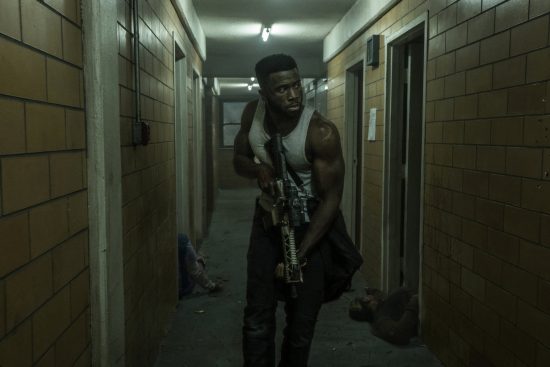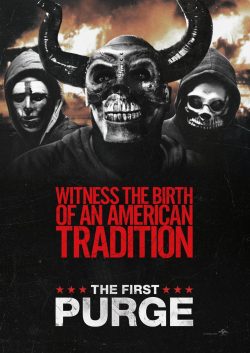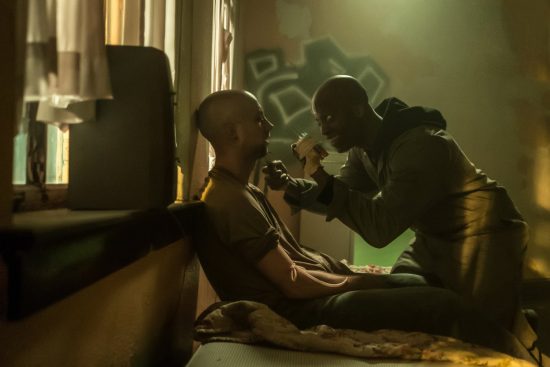 Any way you look at it, The Purge is one of the most distinctive cinematic franchises of the past decade. For one, in amongst the slew of films that are quite clearly horror yet inspire umpteen pseudo-high brow think pieces declaring they’re not horror really, The Purge is one property of which we might genuinely debate its genre status: it’s largely grounded, and might easily be classed as much in the action thriller category. It’s also unique among today’s low-budget, mainstream friendly shockers in that it has always been explicitly political, satirising the social climate in the US in extremely broad strokes. After the third entry, The Purge: Election Year (which, full disclosure, I haven’t seen at the time of writing) was carefully timed to coincide with the contentious 2016 US presidential election, this fourth instalment – the first not to be directed by series creator James DeMonaco, although he remains the writer – takes the prequel route, showing how the annual Purge, one night per year of 100% lawlessness, originally came to be.
Any way you look at it, The Purge is one of the most distinctive cinematic franchises of the past decade. For one, in amongst the slew of films that are quite clearly horror yet inspire umpteen pseudo-high brow think pieces declaring they’re not horror really, The Purge is one property of which we might genuinely debate its genre status: it’s largely grounded, and might easily be classed as much in the action thriller category. It’s also unique among today’s low-budget, mainstream friendly shockers in that it has always been explicitly political, satirising the social climate in the US in extremely broad strokes. After the third entry, The Purge: Election Year (which, full disclosure, I haven’t seen at the time of writing) was carefully timed to coincide with the contentious 2016 US presidential election, this fourth instalment – the first not to be directed by series creator James DeMonaco, although he remains the writer – takes the prequel route, showing how the annual Purge, one night per year of 100% lawlessness, originally came to be.
It’s not surprising DeMonaco chose this instalment to step back from the director’s chair, and not just because he might be a bit tired after directing three of these films over 4 years. The First Purge (originally set to be entitled The Purge: The Island) centres on the New York borough of Staten Island, which plays host to the very first Purge ‘experiment,’ initially a localised event carried out under the decree of the President and the ruling party the New Founding Fathers of America. One thing we can’t fail to note about this community as presented in the film is that it’s predominantly black, and this seems likely to be the key reason the white DeMonaco stood aside in favour of black director Gerard McMurray, who made his feature debut in 2017 with Burning Sands (another one I’ve yet to see).

Of course, producer Jason Blum understands the power of black directors telling black-centred horror stories aimed at a general audience: this, after all, was the key formula behind the commercial and critical success of Get Out, ultimately resulting in Jordan Peele landing a perhaps surprising Best Original Screenplay Oscar. Now, when the think pieces projected the effects of Get Out, I suspect most of us were expecting more stuff along the lines of A Quiet Place and Hereditary; understated, intellectual horror movies designed as much (or possibly more so) for the approval of high brow critics as the masses. However, whilst The First Purge is very much part of Get Out’s legacy, no way is it designed to please the awards voters and the critical establishment. This is old school exploitation satire of the sort Brian Trenchard-Smith once specialised in; there isn’t as much gore and gratuitous nudity, but the sociopolitical commentary is every bit as in your face. Unsurprisingly, it’s about as subtle as a brick, but then these aren’t exactly subtle times we’re living in right now. I daresay populist entertainment which tackles contemporary fears head on this bluntly might be exactly what we need in 2018.
Continuing the series tradition of bringing in an entirely different cast every time (Frank Grillo’s recurring character in the second and third films notwithstanding), The First Purge introduces us to a whole new ensemble, a Staten Island community which is as close-knit as it is fractured. The action kicks off a few hours before the ‘experiment’ is due to begin, overseen by the White House Chief of Staff (Patch Darragh) and the scientist who conceived of the Purge (a curiously uncredited Marisa Tomei). Lex Scott Davis and Jovian Wade are Nya and Isaiah, working class siblings from a run-down apartment complex who look likely to be among those most at risk; but while Nya protests the experiment, Isaiah is on the corner selling drugs on behalf of local kingpin Dmitri (Y’lan Noel), who just so happens to have some history with Nya. The residents may fear for their lives, but not only do many of them lack the means to get away, they’ve also been given an incentive to stay, as the government promises $5,000 to anyone who signs on to ‘participate’ in the experiment, with further bonuses promised to those who chose to further their ‘participation.’ There are of course some among them, notably an extremely unhinged crackhead known as Skeletor (Rotimi Paul), who are thrilled at the prospect of being allowed to kill without consequence. But as the night progresses, loyalties shift and differences are overcome as those trying to stay alive band together – much to the consternation of a government who were banking on different results.
 From the brief glimpse of ‘Black Lives Matter’ banners in an early montage, to a very on-the-nose reference to the current US president, to mobs of killers in Ku Klux Klan and Nazi uniforms, The First Purge never plays its hand close to its chest. Naturally this is going to leave a bad taste in the mouth of the easily offended, and rattle the cages of those people we’re supposed to call ‘alt-right’ now; and this was, of course, clearly the point. Also very much to the point is that the film ultimately sees the people of Staten Island put aside their differences and fight together for the greater good, with figures who might initially seem villainous proving their worth. From a sociopolitical perspective, this is a valuable message to all audiences irrespective of class or colour; from a film fan perspective, it’s evocative of cult classics ranging from Assault on Precinct 13 to Attack the Block. That said, it may be the diehard exploitation aficionados who feel the most short-changed by The First Purge, as in common with most of the films in the series to date (again bearing in mind I’ve missed one), the violence never gets quite so graphic or extreme as you might anticipate. Even so, the message is so heavy-handed that audiences are bound to feel bombarded enough as it is; and I suspect a large portion of the white audience may be pushed out of their comfort zone by how heavily the N-word is used.
From the brief glimpse of ‘Black Lives Matter’ banners in an early montage, to a very on-the-nose reference to the current US president, to mobs of killers in Ku Klux Klan and Nazi uniforms, The First Purge never plays its hand close to its chest. Naturally this is going to leave a bad taste in the mouth of the easily offended, and rattle the cages of those people we’re supposed to call ‘alt-right’ now; and this was, of course, clearly the point. Also very much to the point is that the film ultimately sees the people of Staten Island put aside their differences and fight together for the greater good, with figures who might initially seem villainous proving their worth. From a sociopolitical perspective, this is a valuable message to all audiences irrespective of class or colour; from a film fan perspective, it’s evocative of cult classics ranging from Assault on Precinct 13 to Attack the Block. That said, it may be the diehard exploitation aficionados who feel the most short-changed by The First Purge, as in common with most of the films in the series to date (again bearing in mind I’ve missed one), the violence never gets quite so graphic or extreme as you might anticipate. Even so, the message is so heavy-handed that audiences are bound to feel bombarded enough as it is; and I suspect a large portion of the white audience may be pushed out of their comfort zone by how heavily the N-word is used.
So does this all this mean The First Purge is the edgiest, most shocking and confrontational film you’re likely to see this year? Does it Hell. In common with its predecessors, this is a film that’s first and foremost designed to please a mass audience, and as much as it strives to get a message across, above all else it strives to be entertaining, and it absolutely succeeds in this. McMurray’s direction is confident, and while he may be a little over-reliant on the dreaded shakeycam at times, he successfully builds things up to a searing final act. Along the way, McMurray gets great work out of an endearing and, it must be said, very good looking cast (I’d be surprised if any film this year has a prettier leading man-leading lady combo than Y’lan Noel and Lex Scott Davis; this is a Michael Bay production after all, sexy people are always part of the package). In addition, Rotimi Paul’s Skeletor is one of the most memorable (though sadly underutilised) antagonists of the series. My interest in the Purge movies had been waning, but The First Purge has gone some way to making the franchise great again… and if you’re bothered by how unsubtle that pun was, you might want to give the movie a miss. Otherwise, enjoy.
The First Purge is in cinemas now, from Universal.
